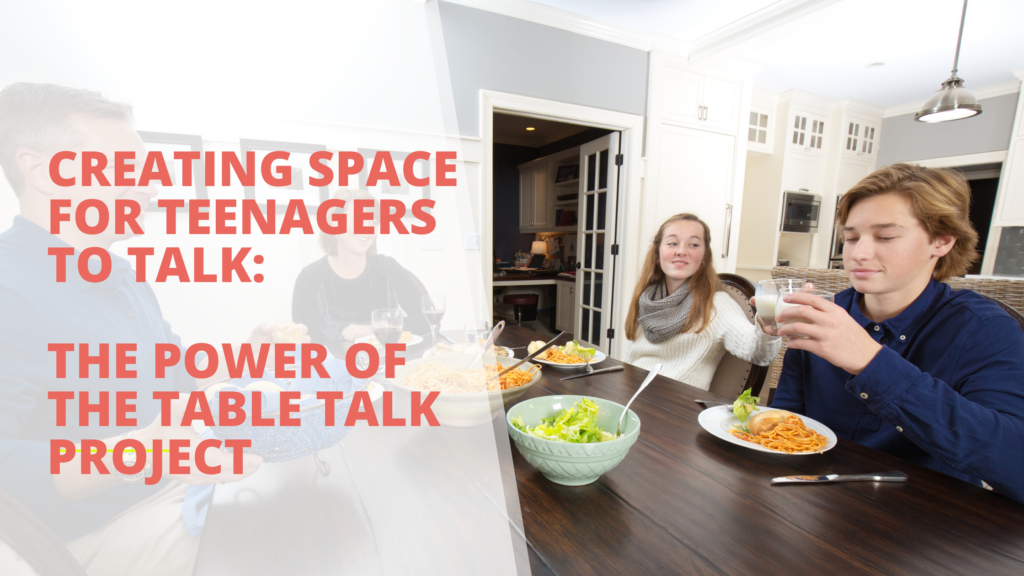
In today’s fast-paced world, where distractions abound and communication takes place predominantly through digital screens, it is becoming increasingly challenging for teenagers to have meaningful conversations. As parents, guardians, educators, and mentors, it is vital to create an environment that encourages open dialogue and provides a safe space for teenagers to express themselves. One effective method of fostering these conversations is through The Table Talk Project, an initiative that emphasises talking at the dinner table. In this blog, we will explore the significance of creating space for teenagers to talk, and how The Table Talk Project can serve as a guide for cultivating meaningful conversations.
The Importance of Teenagers’ Voices:
Teenagers undergo significant personal and emotional growth during their formative years. It is a time when they explore their identities, develop opinions, and face unique challenges. However, they often struggle to find platforms to express their thoughts, fears, and aspirations. By actively creating space for teenagers to talk, we acknowledge the importance of their voices, opinions, and experiences. Engaging them in meaningful conversations not only boosts their self-esteem but also helps in their cognitive and emotional development.
The Power of The Table Talk Project:
The Table Talk Project is a simple, yet powerful concept that centres around talking at the dinner table. It encourages families, caregivers, and communities to dedicate uninterrupted time to share and discuss various topics of interest. By adopting this project, we create an environment where teenagers can feel valued and heard.
Here are some key elements that make The Table Talk Project effective:
- Regular family dinners: The Table Talk Project emphasises the significance of family dinners as a space for communication. Regular gatherings around the dinner table provide a consistent opportunity for teenagers to share their thoughts, concerns, and triumphs. It sets a foundation for building stronger family bonds and fosters a sense of belonging.
- Active listening: Engaging in active listening is essential when creating space for teenagers to talk. It involves giving undivided attention, demonstrating empathy, and encouraging dialogue. By truly hearing and acknowledging their perspectives, we validate their experiences and emotions, which in turn encourages further engagement.
- Welcoming diverse opinions: The Table Talk Project encourages the exploration of various viewpoints and promotes critical thinking. Teenagers often encounter differing perspectives in school, social settings, or through media. By actively encouraging them to express and defend their opinions in a safe environment, we empower them to develop stronger reasoning skills and respect for diverse ideas.
- Open-ended questions: Asking open-ended questions stimulates deeper conversations and helps teenagers articulate their thoughts. Instead of closed questions that elicit simple “yes” or “no” answers, open-ended questions invite them to reflect, share their experiences, and engage in meaningful discussions. This approach enhances their communication skills and broadens their understanding of the world.
Benefits of Creating Space for Teenagers to Talk:
The benefits of creating space for teenagers to talk extend far beyond the immediate conversations. Here are some advantages that arise from engaging in open dialogue:
- Enhanced emotional wellbeing: Sharing their thoughts and experiences allows teenagers to process their emotions effectively. It provides an outlet for them to seek guidance, support, and empathy from trusted adults or peers.
- Strengthened relationships: Regular conversations foster stronger relationships between teenagers and their parents, caregivers, and mentors. Open communication bridges the generation gap, promotes mutual understanding, and builds trust and respect.
- Improved decision-making: Engaging in discussions helps teenagers develop critical thinking skills and consider multiple perspectives. They learn to evaluate consequences, make informed choices, and solve problems effectively.
- Heightened self-confidence: When teenagers are actively listened to and their opinions are valued, their self-confidence grows. They become more comfortable expressing themselves, advocating for their beliefs, and engaging in constructive debates.
Creating space for teenagers to talk is essential for their personal growth, emotional wellbeing, and overall development. The Table Talk Project serves as a valuable guide, emphasising the power of talking at the dinner table. By implementing this initiative, we encourage open dialogue, active listening, and the exploration of diverse perspectives. Let’s seize the opportunity to engage teenagers in meaningful conversations, nurture their voices, and provide them with the support they need to navigate the complexities of their lives.

